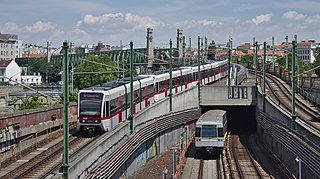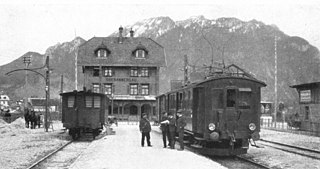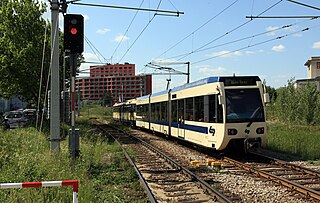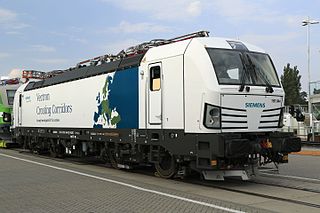
Green Cargo AB is a Swedish state-owned logistics company that transports various types of goods by train. It was created on 1 January 2001 out of the logistics division of Swedish State Railways (SJ). While organised as a public limited company, it is wholly owned by the Swedish government. As of 2019, it was responsible for almost 80% of Swedish rail freight transport.

The Vienna U-Bahn, where U-Bahn is an abbreviation of the German word Untergrundbahn, is a rapid transit system serving Vienna, Austria. The five-line network consists of 83.1 kilometers (51.6 mi) of route, serving 109 stations. 459.8 million passengers rode the U-Bahn in 2019.

Wiener Linien is the company running most of the public transit network in the city of Vienna, Austria. It is part of the city corporation Wiener Stadtwerke.

Vienna has an extensive transport system that includes roads, railways, trams, metro, and buses.

DB Cargo Polska is a Polish company operating mainly in rail freight transportation. It is presently owned by the German state railway company Deutsche Bahn (DB).

The Vienna S-Bahn is a suburban commuter rail network in Vienna, Austria. As opposed to the city-run urban metro network, the Vienna U-Bahn, it extends beyond the borders of the city, is operated by the ÖBB, and consists of many branch lines. S-Bahn is short for Schnellbahn, which can be translated as "rapid railway".

Wien Südbahnhof was Vienna's largest railway terminus. It closed in December 2009 and was demolished in 2010 to be replaced with a new station, Wien Hauptbahnhof. It was located in Favoriten, in the south-east of the city. The East-bound rail services of Südbahnhof remained in operation until 2012 at a temporary train station "Südbahnhof (Ostbahn)".

The EuroSprinter family of electric locomotives is a modular concept of locomotives for the European market built by Siemens Mobility. The internal Siemens product name is ES 64, with ES for EuroSprinter and the number 64 indicating the 6,400 kW power at rail.

Railjet is a high-speed rail service in Europe operated by Austrian Federal Railways (ÖBB) and Czech Railways (ČD). Branded as Railjet Express (RJX) for the fastest services and as Railjet (RJ) for services with additional stops, it was introduced in 2008 and operates at speeds of up to 230 km/h (143 mph). Railjet is ÖBB's premier service and operates both domestically within Austria and on international services to adjacent major cities in the Czech Republic, Germany, Switzerland, Italy, Hungary and Slovakia.

A Lokalbahn or Localbahn is a secondary railway line worked by local trains serving rural areas, typically in Austria and the south German states of Bavaria and Baden-Württemberg. Lokalbahnen appeared at the end of the 19th century before the use of cars became widespread.

The Badner Bahn or Wiener Lokalbahn is a tram-train service in the metropolitan area of Vienna. It runs for 30.4 kilometres (18.9 mi) between Vienna and Baden, and is operated by the Wiener Lokalbahnen Aktiengesellschaft. The entire Badner Bahn is part of the Verkehrsverbund Ost-Region and is one of the most important passenger services owned by WLB. In 2013, 35,000 passengers per day used the service.

Wiener Neustadt Hauptbahnhof is a railway station in Wiener Neustadt, in the federal state of Lower Austria, south of Vienna. With over 700 trains and 25,000 passengers each day, the station is the busiest in Lower Austria.

The Southern Railway is a railway in Austria that runs from Vienna to Graz and the border with Slovenia at Spielfeld via Semmering and Bruck an der Mur. Along with the Spielfeld-Straß–Trieste railway, it forms part of the Austrian Southern Railway that connected Vienna with Trieste, the main seaport of the Austro-Hungarian Monarchy, via Ljubljana. A main obstacle in its construction was getting over the Semmering Pass over the Northern Limestone Alps. The twin-track, electrified section that runs through the current territory of Austria is owned and operated by Austrian Federal Railways (ÖBB) and is one of the major lines in the country.

The Vectron is a locomotive series made by Siemens Mobility, introduced at the 2010 InnoTrans trade fair in four prototype versions: diesel, multi-system, and both AC and DC electric power. The diesel version has been replaced in 2018 by a dual mode locomotive which is powered by electricity on electrified sections of the track and can be switched to diesel mode on non-electrified sections. The Vectron series is reconfigurable and modular, with a Bo'Bo' wheel arrangement, and is intended as the successor to the EuroSprinter family of locomotives. A more affordable, basic version called Smartron was introduced in 2018.

Trams in Vienna are a vital part of the public transport system in Vienna, capital city of Austria. In operation since 1865, with the completion of a 2 km (1.2 mi) route to industrial estates near Simmering, it reached its maximum extent of 292 km (181.4 mi) in 1942. In February 2015, it was the fifth largest tram network in the world, at about 176.9 kilometres (109.9 mi) in total length and 1,071 stations.

Line U2 is a line on the Vienna U-Bahn metro system. Opened in 1980, it currently has 20 stations and a total length of 16.7 km (10.4 mi), from Schottentor to Seestadt. It is connected to U1 at Praterstern and U4 at Schottenring.

Wien Hetzendorf is a Vienna S-Bahn station, served by S1 and S2. The station is 1.63 km (1.01 mi) west of Wien Meidling. The station is situated between Altmannsdorfer Straße and Hetzendorfer Straße. Connections are available to Lines 16A, 62A, 64A of Wiener Linien Bus service and Line 62 of Wiener Linien Tram service.

The Siemens Inspiro is a family of electric multiple unit trains designed and manufactured by Siemens Mobility since 2012 for metro systems. The product was launched on 19 September 2012 at the InnoTrans in Berlin. The first Inspiro entered service with Warsaw Metro on 6 October 2013.
The Vienna pre-metro tramway system was built on separated sections in the 1960s. The underground sections are called Untergrundstrassenbahn or sometimes abbreviated U-Strassenbahn, USTRAB or USTRABA . The pre-metro tunnels are maintained and used by the Wiener Linien, operator of the tramway lines. One section is used as well by the Wiener Lokalbahnen (WLB), the operator of a regional tram-train service.

ComfortJet is a high-speed push-pull train which is being built by Siemens Mobility and Škoda Transportation for the Czech train operator České dráhy and it is planned to start operations from summer 2024. Based on the Railjet, Siemens developed its Vectrain train family. It will operate at speeds of up to 230 km/h and will replace old carriages on international EuroCity services between the Czech Republic, Germany, Denmark, Austria, Slovakia and Hungary and on domestic InterCity services in the Czech Republic.

























